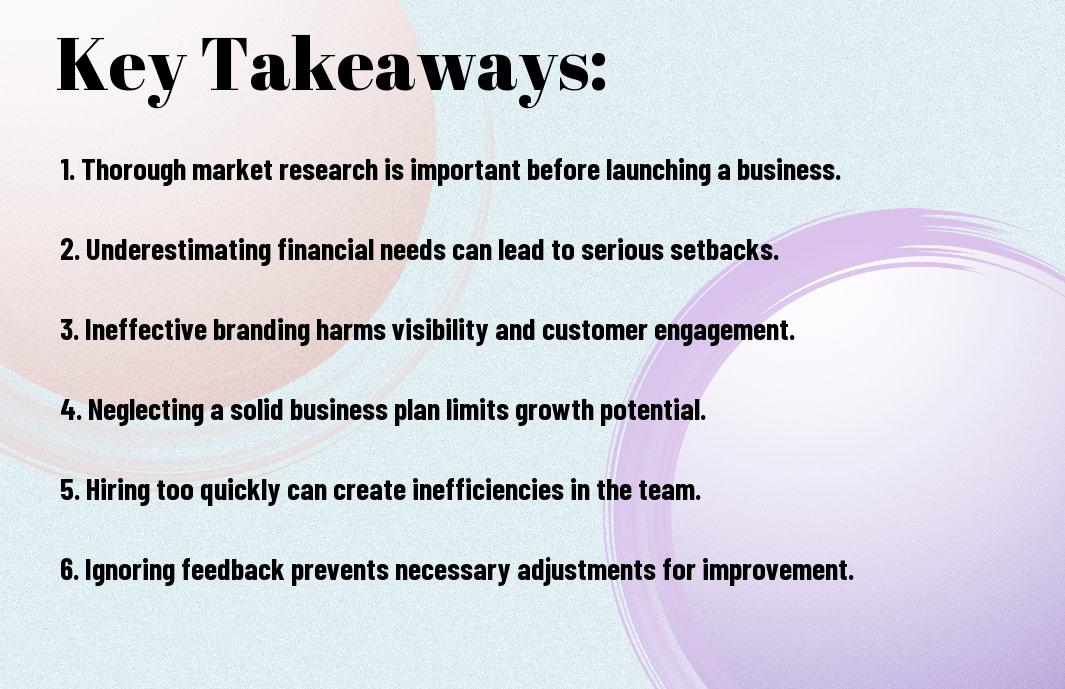Financial missteps can significantly derail your small business’s potential for success. As a business owner, it’s imperative to recognize common pitfalls that may threaten your profitability and long-term sustainability. This guide highlights the top financial mistakes that you should avoid, empowering you to make informed decisions that enhance your business’s financial health. By steering clear of these errors, you can better position your business for growth and stability in an ever-changing market.
Key Takeaways:
- Lack of Financial Planning: Small business owners should create a comprehensive financial plan to guide spending and investment decisions.
- Neglecting Cash Flow Management: Regularly monitoring cash flow is vital to ensure the business can cover operational costs and avoid financial crises.
- Overlooking Taxes: Failing to account for taxes can lead to unexpected liabilities; setting aside funds regularly can alleviate this issue.
- Mixing Personal and Business Finances: Keeping business and personal finances separate helps maintain clearer financial records and simplifies tax preparation.
- Ignoring Professional Advice: Consulting with financial advisors or accountants can provide valuable insights and help avoid costly mistakes.

Common Financial Missteps
The financial landscape can be tricky for small business owners. Many missteps can derail your success, leading to unnecessary complications and losses. Being aware of common pitfalls can help you stay focused on growth and stability, enabling you to make informed financial decisions for your business.
Not Keeping Accurate Records
On your journey as a small business owner, it’s vital to maintain accurate financial records. Inaccuracies can lead to reporting errors, tax issues, and ultimately, poor decision-making. By keeping detailed records of your income, expenses, and transactions, you lay a strong foundation that supports your business’s growth.
Neglecting Cash Flow Management
Before you can ensure the longevity of your business, proper cash flow management is key. Understanding how money flows in and out of your business allows you to meet expenses, invest in growth, and plan for the future effectively.
Keeping a vigilant eye on cash flow involves not just tracking your current balances, but also forecasting future revenue and expenses. Develop a cash flow projection that outlines your anticipated income and expenses for at least three months ahead. This proactive approach will help you identify potential shortfalls and enable you to take necessary actions, such as securing financing or cutting costs, ensuring the financial health of your business.
Improper Budgeting Practices
Any small business owner knows that budgeting is fundamental for success. However, improper budgeting practices can derail your financial health. It’s important to adopt a disciplined approach to budgeting to ensure that you’re allocating resources effectively. To learn more about budgeting pitfalls, check out the Top 5 Financial Mistakes Every Business Owner Should…
Underestimating Expenses
Expenses can often be underestimated, causing cash flow problems down the line. You should consider all potential costs, including hidden expenses like maintenance, taxes, and employee benefits. By anticipating these costs, you can create a more accurate budget that supports your business’s growth.
Overly Ambitious Revenue Projections
Before you set your revenue goals, it’s important to analyze market trends realistically. While optimism is a valuable trait for entrepreneurs, setting overly ambitious projections can lead to disappointment and financial strain. Ensuring that your revenue forecasts align with market conditions will help you build a more stable financial foundation.
Considering the unpredictability of the market, it’s wise to base your revenue projections on historical data and realistic growth rates. This approach minimizes the risk of financial shortfalls and allows for more effective cash flow management. By creating attainable goals, you position your business for sustainable growth and ensure you have the resources necessary to handle unforeseen challenges.
Ignoring Tax Obligations
Now, neglecting your tax obligations can lead to serious financial repercussions for your small business. It’s easy to put off tax planning amidst daily operations, but doing so can result in hefty fines, back taxes, and potential legal issues. Understanding your responsibilities and staying proactive about your tax filings is important to maintaining your business’s financial health.
Failing to Set Aside Tax Funds
An effective strategy involves regularly setting aside funds for taxes to avoid cash flow problems when the time comes to pay your obligations. You should establish a dedicated account for tax savings and contribute to it monthly. This practice helps ensure you have enough resources available and minimizes financial stress during tax season.
Misunderstanding Tax Deductions
Against common belief, tax deductions can vary significantly depending on your business structure and activities. Educating yourself on which expenses qualify can lead to substantial savings. Failing to grasp the rules surrounding tax deductions can result in missed opportunities or even issues with tax authorities.
Also, understanding the details of what constitutes a tax-deductible expense is beneficial for your bottom line. Many small business owners overlook critical deductions such as home office expenses, mileage, and business-related meals. Keeping thorough records and consulting with a tax professional can help you identify available deductions and ensure that you are not leaving money on the table when filing your taxes.

Mixing Personal and Business Finances
Your financial success as a small business owner hinges on clear boundaries between your personal and business finances. When these two streams are mixed, it not only complicates bookkeeping but can also lead to various tax liabilities and penalties. Establishing distinct financial identities for your personal and business activities allows for better financial management, transparency, and compliance with regulations.
Consequences of Co-Mingling Funds
At the heart of co-mingling funds lies confusion and potential legal issues. When personal and business finances intertwine, tracking expenses become daunting, leading to inaccurate financial reports. This situation can attract unwanted scrutiny from the IRS and might expose you to personal liability, putting your personal assets at risk if your business faces debts or lawsuits.
Establishing Separate Accounts
With separate accounts, you can effectively differentiate your business income and expenses from your personal finances. Opening dedicated business bank accounts and credit cards ensures that your financial records are organized and reflect your business’s true financial standing. This practice not only simplifies tax filing but also aids in measuring the performance and profitability of your enterprise.
Consequently, having separate accounts empowers you to create a clear financial picture of your business, making it easier to assess cash flow, manage budgets, and evaluate growth potential. Additionally, maintaining separate finances can help in building a robust credit profile for your business, facilitating access to loans and other financial resources in the future. Establishing this structure ultimately saves you time, reduces errors, and enhances your overall financial health.
Inadequate Financial Planning
Despite the importance of financial planning, many small business owners neglect this critical aspect, leading to significant pitfalls. A lack of foresight can hinder growth, limit opportunities, and result in overwhelming debt. By prioritizing financial planning, you can create a roadmap for your business, ensuring that you’re prepared for both the expected and unexpected expenses that may arise.
Lack of a Comprehensive Business Plan
Between launching your business and managing daily operations, developing a comprehensive business plan may not feel urgent, but avoiding this step can lead to chaos. A well-crafted business plan outlines your goals, revenue projections, and strategies for growth, helping you navigate the complexities of running your business effectively.
Not Planning for Emergencies
Any business can face unexpected challenges, from sudden market shifts to unforeseen expenses. Without a solid emergency plan, your business may struggle to recover from these setbacks. Having a financial buffer can help you navigate these tough times without jeopardizing your business’s long-term stability.
Plan for emergencies by setting aside a portion of your income in a business savings account. This fund acts as a safety net that allows you to respond swiftly to financial challenges without taking on debt. Consider regularly reviewing and adjusting your savings based on your business’s current revenue and projected risks. By taking these proactive steps, you ensure that your business remains resilient, regardless of the hurdles that come your way.
Underestimating the Importance of Professional Guidance
All small business owners often try to manage their finances independently, mistakenly believing that they can handle everything. However, this approach can lead to significant drawbacks, including costly mistakes and missed opportunities. Engaging with professional guidance can provide you with valuable insights and strategies that enhance your financial decision-making and contribute to your business’s long-term success.
Benefits of Hiring Financial Advisors
Above all, hiring financial advisors equips you with expertise that can help in navigating complex financial landscapes. Their knowledge of market trends, regulations, and tax implications can save you time and money, allowing you to focus on growing your business. With tailored advice, you can make informed decisions that align with your goals and optimize your financial performance.
Knowing When to Seek Help
Between managing daily operations and striving for growth, you may encounter financial scenarios that exceed your expertise. It’s crucial to recognize when these situations arise and seek help to avoid potential pitfalls. Early intervention can prevent minor issues from escalating into major setbacks.
And knowing when to seek help is vital for your business’s sustainability. If you find yourself overwhelmed by financial reports, uncertain about tax obligations, or recall facing difficulties in cash flow management, it’s time to consult a financial professional. The right guidance can provide clarity and direction, ensuring that your business remains on a path of growth and stability.
To wrap up
On the whole, avoiding financial pitfalls is crucial for the longevity of your small business. By educating yourself about common mistakes, such as poor budgeting, neglecting cash flow management, and failing to seek professional advice, you equip yourself for success. Stay proactive and continually assess your financial practices to ensure you’re on the right path. For further insights, check out this resource on Big financial mistakes and how to avoid them.
Q: What are some common financial mistakes small business owners make regarding budgeting?
A: One frequent mistake is failing to create a comprehensive budget. Without a budget, it’s challenging to track expenses accurately or plan for future financial needs. Small business owners should develop a detailed budget that includes fixed and variable costs, along with anticipated income. It’s equally important to review and adjust the budget regularly to reflect changes in the business environment or performance, which helps ensure financial stability.
Q: How can small business owners avoid cash flow issues that often lead to financial troubles?
A: Cash flow management is vital for the health of any small business. Owners can avoid cash flow problems by keeping a close eye on accounts receivable, ensuring timely invoicing, and following up on overdue payments. Establishing a cash reserve can also provide a buffer during lean periods. Additionally, developing relationships with suppliers for flexible payment terms can help manage cash flow more effectively.
Q: What role does financial literacy play in preventing financial mistakes for small business owners?
A: Financial literacy is vital for small business owners to make informed decisions about their finances. Understanding basic financial concepts, such as profit margins, return on investment, and operating expenses, can significantly influence business strategy. Engaging in continuous learning through courses, seminars, or consulting with financial advisors can empower owners to recognize potential pitfalls, enabling them to make better financial decisions and ultimately enhance their business’s success.

